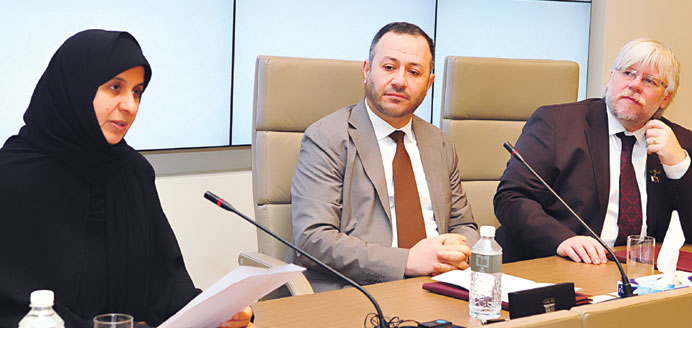|
The Qatar University (QU) and Mada Qatar Assistive Technology Centre yesterday signed a Memorandum of Understanding that will support the assistive technology needs of persons with disabilities at the university. |
The deal will also integrate learning about assistive technology and accessible design into the curriculum offered to students at the university.
The three-year agreement was signed by QU vice president and chief academic officer Dr Mazen Hasna and Mada Centre CEO David Banes, in the presence of College of Education (CED) dean Dr Hissa Sadiq, faculty and staff.
Included in the terms of the agreement is the professional development of QU faculty and team members of QU Special Needs Section and Mada Centre to identify and seek research opportunities in areas of mutual interest; and provision for persons with a disability at QU with appropriate assistive technology (AT) and devices, assessment and advice identifying appropriate technologies for personal use, as well as suitable training in the use of personal technology to enhance their access to education.
The MoU provides for input on appropriate courses offered in academic units such as QU’s College of Education and College of Engineering to integrate learning on assistive technology and e-accessibility.
QU staff will receive appropriate training in order to improve knowledge and awareness of assistive technology and inclusive design, and students provided with internship opportunities through Mada’s partnership with TumuhaTEC with the objective to engage them on innovative methods and raise their awareness and skills in accessing relevant technology.
Dr Hasna described Mada Centre as a key player in improving the lives of citizens and residents with disabilities in Qatar, and the latest institutional collaborator with Qatar University.
“This agreement expands, extends, and formalises the already existing and valuable collaboration between several units within QU and Mada.”
David Banes said Mada has a long term plan to offer technological support for QU and its special needs students.
Dr Sadiq pointed to a “simple and powerful statement” by which the College of Education is guided, ‘Together we shape the future through excellence in teaching, scholarship, and leadership’, and noted that the motto also reflects the relationship the college already has with Mada and the greater opportunities that will be created through the MoU.
“Mada already provides invaluable expertise on assistive technology to Qatar’s future leaders in special education who we prepare through the Master of Education in Special Education programme. Additionally, through our National Centre for Educator Development, we have supported Mada’s efforts to provide advanced training in assistive technology to educators in the country through an intensive course of workshops, first in English and later this year in Arabic. With Mada, we are indeed shaping the future of opportunities for students with additional educational support needs in Qatar.”
She added: “This MoU will help us to expand our partnership through activities such as providing content on assistive technology in our other programmes that prepare Qatar’s teachers and school leaders and collaboration on research projects through our new research unit.”

